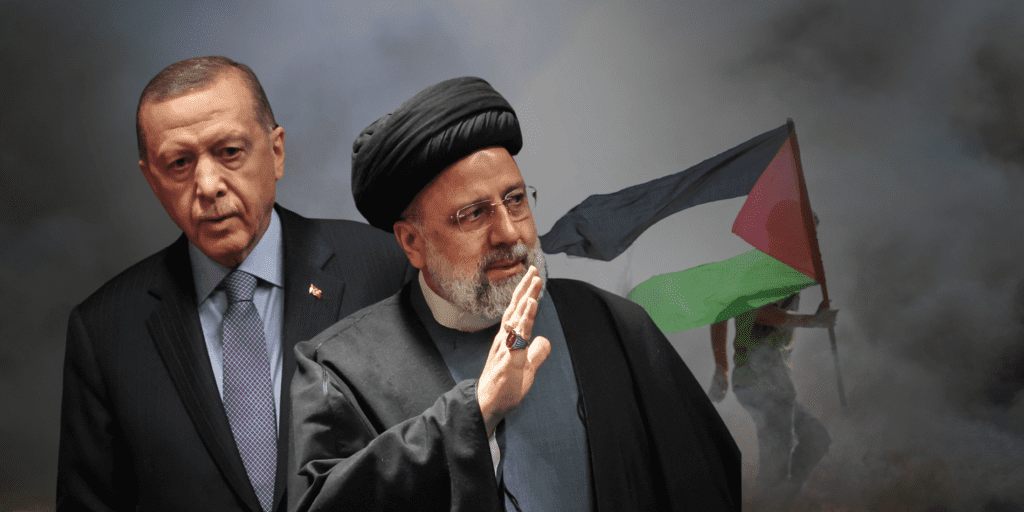On January 24, the presidents of Iran and Türkiye met in Ankara amid a rapidly deteriorating security situation in the Middle East. While the meeting, which had been postponed twice, covered a broad range of bilateral topics, the war on Gaza and related clashes across the region provided an inescapable backdrop. Although the two sides have found common ground in their support for the Palestinians and in opposing broader, regional escalation, the war also highlights fundamental differences that could affect their relationship going forward.
Vitriolic criticism of Israel is nothing new for Iran, whose opposition to Israel is a pillar of state ideology. Like Iran, Türkiye strongly supported South Africa’s genocide case against Israel at the International Court of Justice (ICJ). Turkish President Recep Tayyip Erdogan has frequently criticized Israel during his 20 years in power, although to varying degrees at different times. Since October 7, the Turkish leader has been unsparing in his denunciation of Israeli actions in the Gaza Strip. Erdogan has described Israel as a “terror state” committing war crimes, while asserting that Hamas is a political party and not a terrorist organization. He also denounced Prime Minister Benjamin Netanyahu as a “tyrant” no different than Adolf Hitler.
While Erdogan’s fiery rebukes were no doubt welcomed in Tehran, the two states are far from aligned on Israel’s place in the region, at least in terms of policy. Unlike Iran, Türkiye is not calling for Israel’s destruction. The two countries have longstanding relations, and Türkiye is a member of the North Atlantic Treaty Organization (NATO) along with Israel’s closest allies. A fundamental change in Türkiye’s stance on Israel would likely impact its broader foreign policy, which Ankara is unlikely to want to alter. Israel is a significant economic partner for Türkiye, as the 10th largest market for Turkish exports and 29th largest supplier of imports to Türkiye. Indeed, the two countries are likely to normalize diplomatic relations after the fighting in Gaza stops and reconstruction begins, much like they eventually resumed relations in the wake of the Mavi Marmara incident in 2010.
Turkish Dilemmas
Beyond their vastly different relationships to Israel, the two countries also have contrasting views on the role of non-state militants in the region, who are key actors in the current war. There is little doubt that Türkiye opposes the agenda of the so-called Axis of Resistance formed by groups aligned with and/or backed by Iran operating across the Middle East. Ankara, for example, does not back Hezbollah in Lebanon. Türkiye and Iran backed opposing sides in the Syrian civil war, and when it comes to Hamas, Ankara’s backing is primarily political.
The current crisis in the Red Sea has highlighted further differences. Iran officially recognizes the Sanaa-based government of the Houthis, who responded to the war on Gaza by attacking Israel and U.S.-linked vessels, triggering Operation Prosperity Guardian. In contrast, Türkiye supports the Aden-based, internationally recognized government of Yemen.
This places Ankara in a precarious position vis-à-vis Tehran—one that a regional war would exacerbate. On the one hand, Türkiye’s pro-Palestinian image is a crucial asset at home and in its foreign relations. In this regard, the government has openly criticized the U.S.-led campaign against the Houthis, accusing its own NATO allies in Washington and London of aspiring to “turn the Red Sea into a bloodbath.” Yet Ankara is also keen to protect its growing ties with Saudi Arabia, one of the Houthis’ arch-enemies, and is reluctant to publicly support the Houthi camp—let alone the Axis of Resistance.
Moreover, Türkiye sees a potential regional expansion of the Gaza war, further implicating the Axis of Resistance, as a threat to its national interests and foreign policy, especially in light of geopolitical competition between Iran and Türkiye in the Middle East. In particular, it fears a regional conflict could fan more assertiveness by Kurdish groups opposing Türkiye in northern Iraq and Syria, including the Kurdistan Workers’ Party (PKK); the leftist, pro-Kurdish Peoples’ Democratic Party (HDP); and the People’s Protection Unit (YPG), which is the armed wing of the Syrian Democratic Union Party (PYD) linked to the PKK.
Since October 7, clashes between these groups and Turkish forces have increased markedly. The last thing Türkiye wants is to see Kurdish armed groups emboldened to challenge its interests. The increasing action of Kurdish groups opposed to Türkiye, especially in northern Iraq, could possibly extend to Iran if groups like the Democratic Party of Iranian Kurdistan (KDPI), Free Life Party of Kurdistan (PJAK), Komala, and the Kurdistan Freedom Party further mobilize against the Islamic republic. Türkiye’s airstrikes and Iran’s missile attacks on Kurdish armed groups in northern Iraq in recent months clearly signal the two states’ shared concern.
A region-wide conflagration would also deepen the divisions between Türkiye and its Western peers in NATO. Unlike Iran, which has faced decades of Western sanctions and clearly opted to bolster its alliances with Russia and China, Türkiye does not want to pivot its foreign policy eastward. One reason Ankara has played an active role in the crises in Ukraine and the Middle East is this desire to maintain balanced ties with its foreign partners. It has no interest in seeing this relative advantage burn up in the flames of intensifying disputes with Israel and a regional war.
Iranian Interests
Despite its far more hostile stance towards Israel, Iran shares Türkiye’s desire to avoid a full-scale regional conflict. Tehran has tried hard to avoid directly entering the Gaza war and has repeatedly emphasized that resistance forces it backs across the Middle East, including Hamas, Hezbollah, and the Houthis, are autonomous actors rather than Iranian proxies.
Indeed, Iran believes that numerous Israeli attacks on Iranian targets in Syria—especially those that have killed several commanders of the Islamic Revolutionary Guard Corps (IRGC)—are aimed at dragging it into a direct conflict with the United States. Therefore, in a complex combination of ideology and pragmatism, Iran has opted to do what it can to keep the war limited to Gaza and prevent a full-scale spillover into Lebanon and Syria.
That said, Tehran has reaped a number of benefits from the ongoing war. The conflict has indefinitely suspended the process of normalizing Israel’s relations with Arab and Islamic countries, especially Saudi Arabia. It has bogged Israel down in Gaza for the foreseeable future, draining resources that could have been used to carry out operations directly against Iran. And, crucially for Iran, Israel’s killing of tens of thousands of civilians, especially women and children, has deeply damaged the state’s image and prestige internationally, as well as that of the United States.
Despite these benefits and Tehran’s differences with Ankara on a number of regional issues, both governments share a strong desire to contain the spread of the war on Gaza. If anything, the current crisis is another example of the complexity of relations between the two governments in the face of conflict, as was already evident in Iraq, Syria, and the South Caucasus. Despite the numerous geopolitical differences between Türkiye and Iran, both states can be expected to compartmentalize other issues to maintain their bilateral relations and prevent regional escalation.


